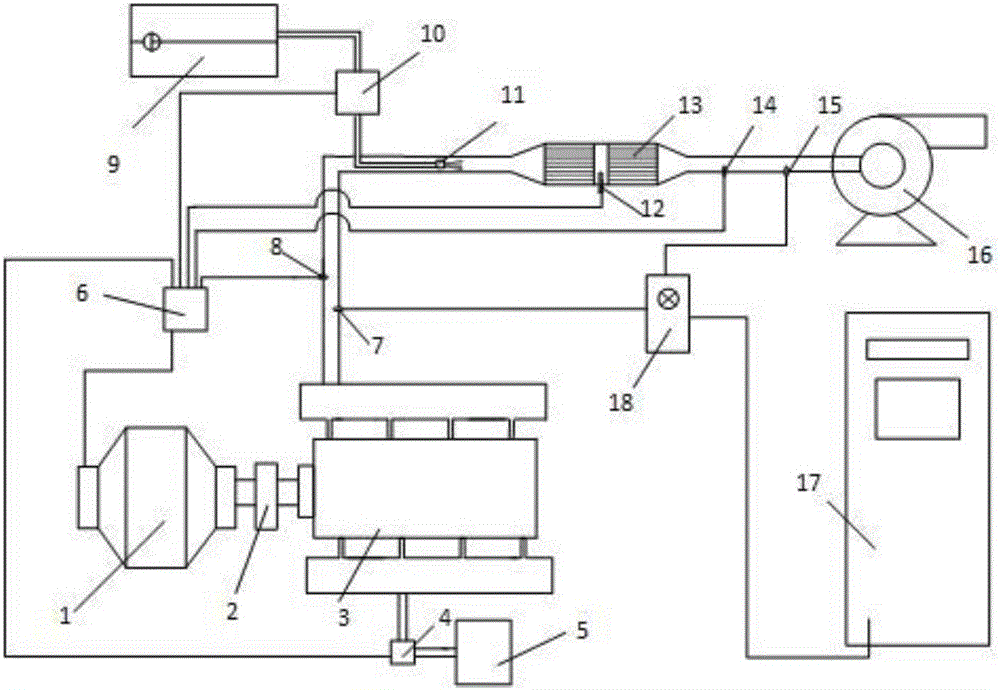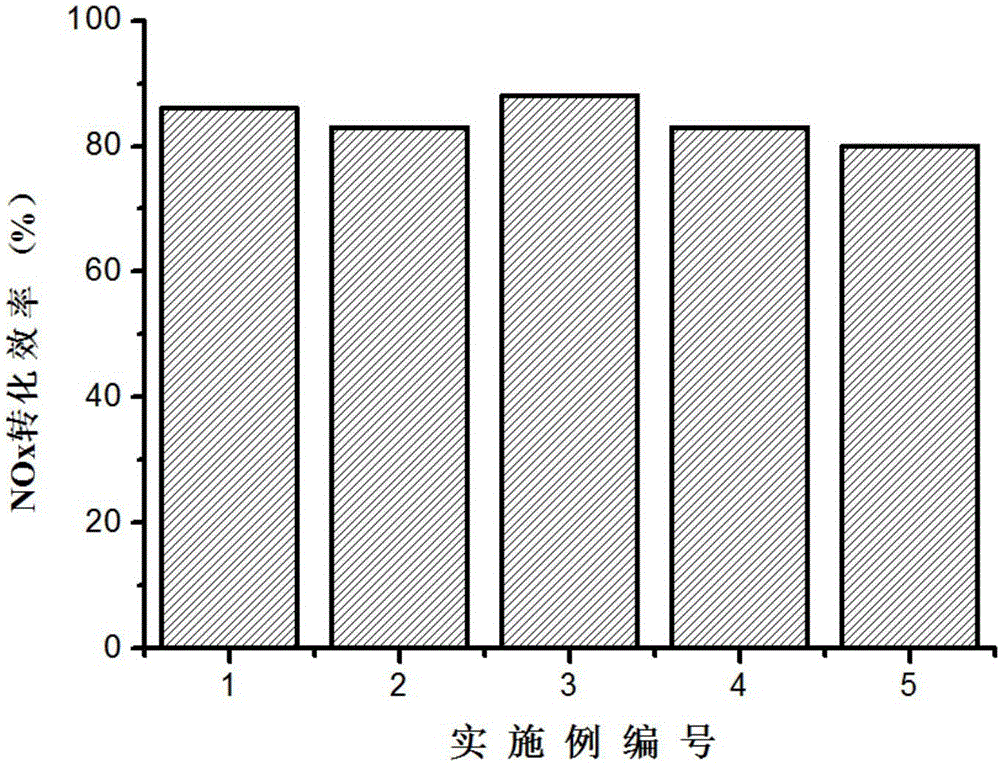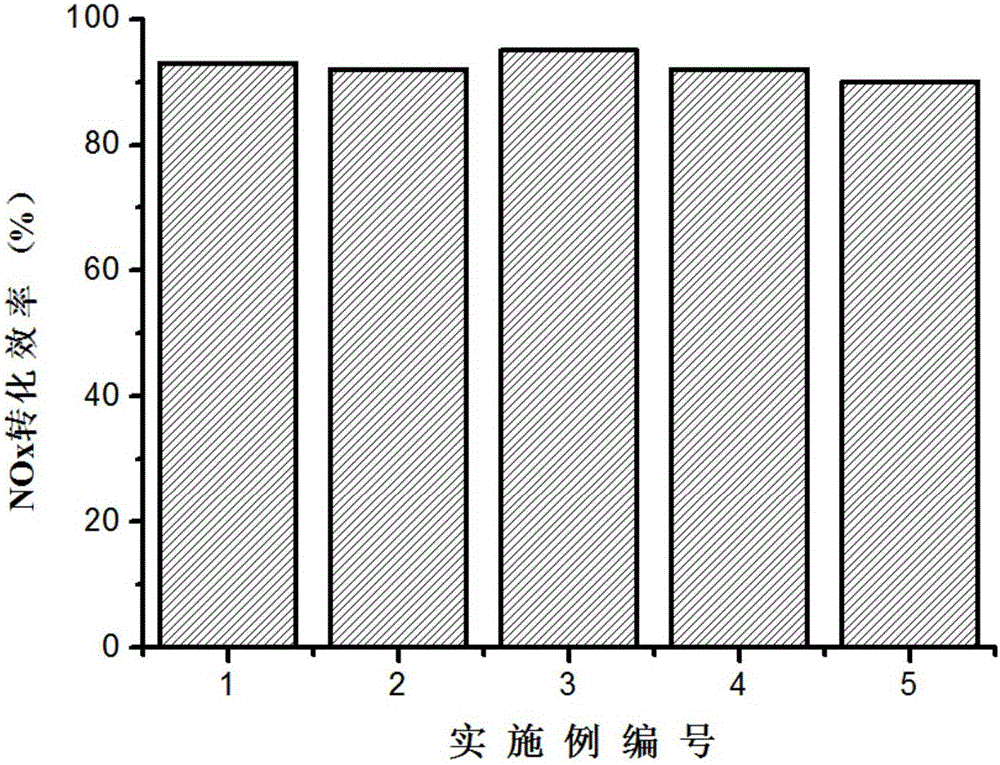Ferrous modified molecular sieve type diesel engine selective catalytic reduction catalyst
A molecular sieve and catalyst technology, which is applied to the catalyst for purifying nitrogen oxides in the exhaust gas of internal combustion engines and the field of preparation thereof, can solve the problems of low chemical activity and unfavorable catalysis, so as to reduce environmental hazards, promote oxygen storage performance, and improve low-temperature SCR. The effect of reaction catalytic activity
- Summary
- Abstract
- Description
- Claims
- Application Information
AI Technical Summary
Problems solved by technology
Method used
Image
Examples
preparation example Construction
[0037] (3) Preparation of coating slurry
[0038] The prepared ferrous-La bimetallic modified ZSM-5 molecular sieve main catalyst and Ce(NO 3 ) 3 ·6H 2 O, Zr(NO 3 ) 4 ·5H 2 O, pure γ-Al 2 o 3 Powder, pure TiO 2 Powder, silica sol, polyethylene glycol, and nitric acid are added to deionized water whose mass is equivalent to 10 to 15 times the total mass of the catalytic coating to be prepared, and fully stirred to form a uniform slurry. Adjust the pH value of the homogeneous slurry to 3-4 with 1mol / L sodium hydroxide solution or glacial acetic acid. The uniform slurry is ground on a wet grinder until the D50 particle size is in the range of 1.0-1.2 microns, and then the ground uniform slurry is stirred at 60-80° C. for 16-24 hours to obtain the coating slurry.
[0039] (4) Coating of coating slurry
[0040] Design the mass of the 400-mesh cordierite honeycomb ceramic carrier to be coated with the catalytic coating; weigh the cylindrical 400-mesh cordierite honeycomb c...
Embodiment 1
[0043] (1) Determination of the amount of preparation and supported catalyst raw materials
[0044] In the main catalyst of the catalyst prepared in Design Example 1, FeO, La 2 o 3 And the mass percent of ZSM-5 molecular sieve is respectively: 12%: 8%: 80%. CeO in cocatalyst 2 and ZrO 2 The mass percentages are: 80% / 20%. The mass percentage of main catalyst, co-catalyst and coating base material is: 10%:10%:80%. Among coating base materials, SiO 2 、TiO 2 with γ-Al 2 o 3The mass percentages are respectively: 30%: 40%: 30%. Every 100g of catalytic coating requires 10g of polyethylene glycol with an average molecular weight of 20000 and 50g of nitric acid; every 100g of ferrous-La bimetallic modified ZSM-5 molecular sieve needs 300ml of n-hexane.
[0045] Calculate the amount of raw materials required for preparing 2000g of catalytic coating according to the conversion ratio: ferrous chloride [FeCl 2 4H 2 O]66.5g, lanthanum nitrate [La(NO 3 ) 3 ·6H 2 O] 42.5g, ZSM-...
Embodiment 2
[0054] (1) Determination of the amount of preparation and supported catalyst raw materials
[0055] In the main catalyst ferrous-La bimetallic modified ZSM-5 molecular sieve of the prepared catalyst of Design Example 2, FeO, La 2 o 3 And the mass percent of ZSM-5 molecular sieve is respectively: 5%: 3%: 92%. CeO in cocatalyst 2 and ZrO 2 The mass percentages are: 70% / 30%. The mass percent of main catalyst, co-catalyst and coating base material is: 20%:20%:60%. Among coating base materials, SiO 2 、TiO 2 with γ-Al 2 o 3 The mass percentages are respectively: 20%: 70%: 10%. Every 100g of catalytic coating requires 15g of polyethylene glycol with an average molecular weight of 20,000 and 25g of nitric acid; every 100g of ferrous-La bimetallic modified ZSM-5 molecular sieve requires 200ml of n-hexane.
[0056] Calculate the amount of raw materials needed to prepare 2000g of catalytic coating according to the conversion ratio: FeCl 2 4H 2 O 55.4g, La(NO 3 ) 3 ·6H 2 O ...
PUM
 Login to View More
Login to View More Abstract
Description
Claims
Application Information
 Login to View More
Login to View More - R&D
- Intellectual Property
- Life Sciences
- Materials
- Tech Scout
- Unparalleled Data Quality
- Higher Quality Content
- 60% Fewer Hallucinations
Browse by: Latest US Patents, China's latest patents, Technical Efficacy Thesaurus, Application Domain, Technology Topic, Popular Technical Reports.
© 2025 PatSnap. All rights reserved.Legal|Privacy policy|Modern Slavery Act Transparency Statement|Sitemap|About US| Contact US: help@patsnap.com



